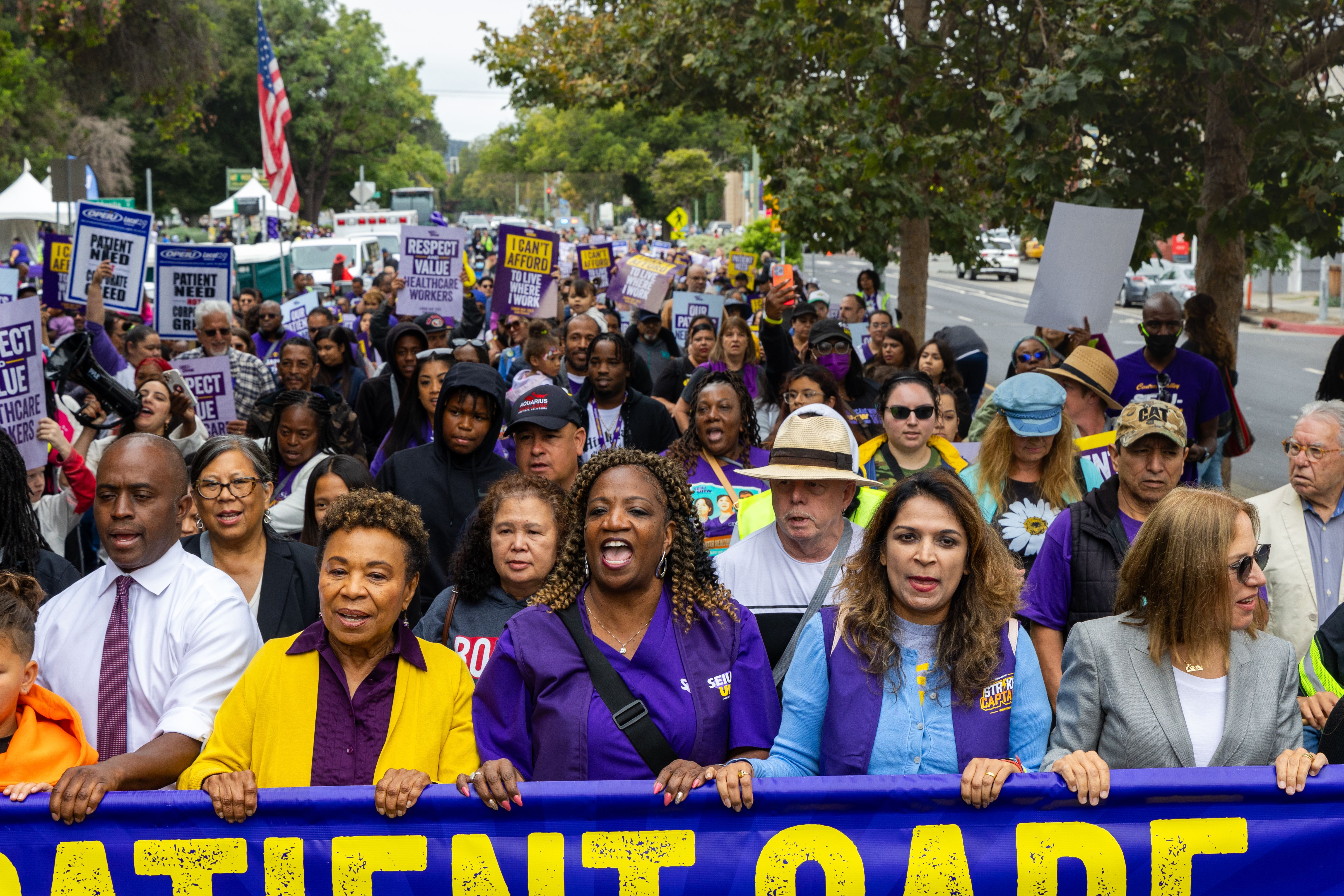Kaiser Permanente union workers approve new contract with 21% raises
A month after tens of thousands of workers went on strike, the union members voted in favor of a four-year pact which includes provisions to boost staffing.
Following months of negotiations, a massive strike and a threat of another walkout, Kaiser Permanente’s union workers have signed off on a new contract.
Kaiser Permanente union workers have signed off on a four-year contract that includes 21% raises, sets minimum wages and offers provisions to improve staffing. (Image: SEIU-UHW)

More than 85,000 members of the Coalition of Kaiser Permanente Unions approved a new, four-year pact. The California-based health system and labor leaders reached a tentative agreement last month, but the union’s rank-and-file still had to ratify the deal.
Union leaders said Thursday that 98.5% of the workers signed off on the new contract.
The contract offers raises of 21% over the four years of the pact and concessions to improve staffing. Caroline Lucas, executive director of the Coalition of Kaiser Permanente Unions, referenced the staffing provisions as she touted the new contract.
“Tens of thousands of healthcare workers have been fighting with one goal in mind: to finally have the resources they need to keep patients safe. Today, we celebrate a huge step forward in addressing persistent staffing problems,” Lucas said in a statement.
“This new contract is not only a victory for Kaiser’s patients and employees, but for all frontline healthcare workers and those who rely on them in our moments of need. When healthcare workers win, we all win.”
More than 75,000 Kaiser Permanente workers, including nurses, pharmacists, and radiology technologists, engaged in a three-day strike in early October. Labor leaders called it the largest healthcare workers’ strike in U.S. history. The coalition warned of the possibility of a second strike in November, but the two sides hammered out the agreement in the following days.
The deal runs from Oct. 1, 2023 through Sept. 2027, and covers Kaiser facilities across California, Colorado, Oregon, Washington, Hawaii, Maryland, Virginia, and Washington, D.C.
Based in Oakland, Calif., Kaiser Permanente operates 39 hospitals and more than 600 other medical offices. Kaiser’s health plan serves nearly 13 million members.
The new pact includes a minimum wage for workers across the system, with variations in markets. The system’s starting wage would be $25 per hour in California, which reflects a state law that imposes a minimum wage of $25 for healthcare workers at large hospitals by 2026. In Kaiser facilities outside of California, the minimum wage would be $23 per hour.
Both the unions and Kaiser Permanente said the new pact includes provisions to improve staffing throughout the system, and labor leaders said that was an important element in the contract to protect workers and patients. Union leaders also said that the contract would also enable Kaiser Permanente employees to get more training so they could advance in their careers.
The unions said the contract calls for the development of a joint staffing progress so workers and managers can set appropriate staffing levels. There will be a one-year “accelerated hiring process” to hire new workers more quickly, and also train current staff to fill vacancies, the coalition said.
Union leaders said they were pleased that the deal also offers protections against outsourcing and subcontracting, an issue which became a contentious element in the negotiations.
Steve Shields, senior vice president of Kaiser Permanente who leads the system’s labor relations, said during a news conference last month that the deal offers a lot of positives for both sides.
“I'm very excited about this agreement,” Shields said. “I think it is great for Kaiser Permanente. I think it is great for our employees and the unions that represent.”
After announcing the deal last month, Kaiser said the agreement offers “competitive wages, excellent benefits, generous retirement income plans, and valuable job training opportunities that support their economic well-being, advance our shared mission, and keep Kaiser Permanente a best place to work and receive care.”
Dave Regan, president of SEIU-United Healthcare Workers West, which represents the bulk of the union workers, touted the new deal as a big win for Kaiser’s workers, and other unions.
“Frontline healthcare workers across states, facilities, and professions have shown the world what is possible through unity,” Regan said in a statement.
Regan also praised Acting U.S. Labor Secretary Julie Su for her work in bringing the two sides together. Regan thanked Su and President Biden’s administration “for their support of workers' right to bargain collectively and their efforts to help reach an agreement that addresses the staffing challenges facing healthcare workers and their patients.”
Kaiser Permanente leaders previously credited Su for playing a key role in brokering a deal. At the October news conference, Shields said the agreement had a number of elements of common interests and Su“helped us see that on a number of occasions.”
Hospitals have seen other high-profile labor battles recently.
In January, thousands of nurses in New York went on strike before reaching an agreement on a contract. About 15,000 Minnesota nurses took part in a three-day strike in September 2022, and they threatened a second walkout in December, but labor and management agreed on a deal.
Newsletter
Get the latest hospital leadership news and strategies with Chief Healthcare Executive, delivering expert insights on policy, innovation, and executive decision-making.